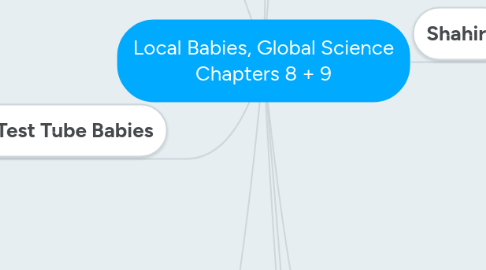Local Babies, Global Science Chapters 8 + 9
by Natasha Ayers

1. Infertility: Differences Between Genders
1.1. A problem of patriarchy: in order to prove his masculinity, Moustafa replaces his first wife for a younger model in which to make light of HIS fertility issue.
1.2. Fertility as a status symbol, in which people of both genders are desperate to achieve. When infertility strikes, the emotional effects can be catastrophic for both sexes.
1.3. ICSI technology bridges the gap for those who have success with it.
1.4. Infertility is a nightmare for both sexes. If it is male infertility, the woman's life is equally destroyed, while men always have the option to "replace" his wife if need be.
1.5. Fathering children is a symbol of virility and achieving one's masculine identity. It's how patriarchy essentially gets asserted.
1.6. Asserting one's masculinity is a source of competitiveness.
1.7. Male infertility is essentially a form of emasculation; it's problem rarely admitted in public or to families.
1.8. Wives often "cover" for their husband's infertility due to the social stigma.
2. Gender Dynamics & Test Tube Babies
2.1. Some men refuse to acknowledge the infertility problems are theirs.
2.2. A man's infertility can render a woman more powerful in the marriage, a scary and threatening predicament for the patriarchy.
2.3. Having children is socially mandatory, particularly for the wealthy.
2.4. Twins or triplets from IVF/ ICSI are a desired goal because it allows technology to achieve several babies in one, efficient swoop.
3. Feminist Place in IVF
3.1. Does technological baby making objectify women's bodies? Is this objectification real if the women want and are pursuing the technology to correct a problem?
3.2. Technopatriarchs: putting the power of creating life into the hands of men with technology.
3.3. Is the obsessive importance of becoming a mother "biologically" necessary if it places such danger upon women's bodies through heavy drugs and surgical manipulation?
3.4. Is biological the only option women see as attainable to become mothers? And full-fledged members of society?
3.5. Women who have been educated, own businesses, and maintain lives outside of the home still see having children and raising them as part of their feminine identities. Most are happy to give up careers to have children.
3.6. Women describe the IVF process as hell.
4. Egyptian Identity = Marriage + Children
4.1. Married couples always want children. No one would ever admit publicly that they do not want children.
4.2. Egyptians are really big on marriage, especially due to societal pressure.
4.3. Marriages are viewed as unstable without children to hold families together
5. IVF & Stigma
5.1. Parents are quite wary about expressing their children were conceived through scientific means.
5.2. Some parents do and some don't tell their children they were conceived via IVF/ ICSI
5.3. Women are often left to suffer in silence, and are too ashamed to seek therapy or other methods of coping.
5.4. The stigma along of being infertile is more than most people can bear; admitting you've done IVF/ ICSI is even more damning.
5.5. Women fear the stigmas placed on them for being infertile and the subsequent discrimination
6. Shahira
6.1. 25 year old 2nd wife of Moustafa
6.2. Highly educated, college degree holder, Christian, runs a business.
6.3. Sahira was perfectly accepting of Moustafa's infertility; she was not looking for a father to her potential children.
6.4. More interested in having a "father figure" as a husband.
6.5. Raised her younger siblings after her mother died, and father spent much time away from the family due to work.
6.6. Practical-minded; she saw her marriage as a union, not necessarily based on precarious romantic love.
6.7. Loves her husband's compassion and kindness.
6.8. Fully accepting of her husband's infertility, she agrees to try multiple IVF rounds for him.
6.9. Greatly disliked the ICSI process, involving surgery and heavy drugs.
6.10. Gets pregnant with twins successfully with ICSI
7. Moustafa
7.1. Married to his first wife for 17 years, "replaced" her due to his infertility issues
7.2. Emasculated because of his severe infertility: low sperm count, poor motility
7.3. Underwent years of treatment and therapy to help correct the issue
7.4. He and Hala, his first wife, could not repair the damage done to their marriage as a result of their childlessness
7.5. Infertility caused great insecurities in him; he happily makes it appear, after Shahira becomes pregnant, that the infertility troubles of his first marriage were at the fault of Hala, his then wife
7.6. Sees Shahira as a potential caretaker of himself
7.7. Smokes 3 packs of cigarettes a day; wonders why he is infertile
8. Hala
8.1. Cast off when she was no longer seen as viable, reproductive, desirable
8.2. Blamed her childless marriage on her infertile husband; made it clear that it was HIS problem, much to his dislike.
8.3. We hear about her, but her story is not told
8.4. Left on her own in divorce, facing possible cultural rejection as part of one's identity is having produced children.
9. Maisa + Ahmed
9.1. Maisa is infertile due to medical malpractice
9.2. Ahmed has low sperm count and a prostate infection
9.3. Only willing to try IVF because the physician is a family member. Otherwise, no one in their families known they are infertile due to the fear of the stigma associated with infertility and IVF.


